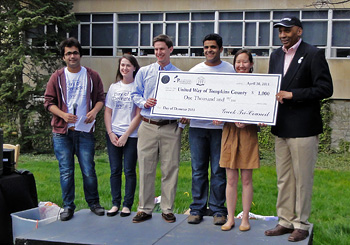End hazing at Cornell: Join the conversation via a new blog
What do you think of the policy recommendations aimed at ensuring that hazing of all kinds be eliminated from Cornell's Greek culture? The task force charged last October by President David Skorton to address the issue wants to hear the opinions of the Cornell community.

The Cornell Greek community marks the coming of spring each year with the Day of Demeter program by giving back to the community. Above, members of Cornell's Greek community present a check to the United Way of Tompkins County in 2011. Day of Demeter is aligned with Greek mythology; Demeter is the Goddess of the Harvest.
As its name suggests, the "Recruitment, Acceptance, Retention and Education" (RARE) task force, named for the various components of membership in a Greek organization, is focused on preventing hazing during the entire Greek experience, not only during the new-member education period. RARE recently published preliminary recommendations and is seeking input through its blog at blogs.cornell.edu/rare/.
"We invite everyone to learn more about the recommendations, weigh in and join the conversation," says task force co-chair Bob Forness '87. RARE will use this blog from now until the end of the 2012-13 academic year to help improve and refine its recommendations and to communicate during the implementation process.
Because pledging and hazing -- two distinct terms -- are inextricably entwined historically, RARE's challenge is to provide a roadmap to unlinking them and making Cornell's new-member process free of hazing, or what Forness calls a "truer reflection of the Greek-system's highest ideals of vibrant chapters and lifelong bonds of friendship."
"While any recommendations will need to be approved and accepted by President Skorton," says Travis Apgar, the Robert G. Engel Associate Dean of Students, "we're looking to get input from those who have the most at stake in the Cornell Greek system -- students and alumni."
Cornell is home to one of the largest Greek systems in the country. Nearly a third of the undergraduate population at Cornell belongs to one of the 66 chapters recognized by the university. Consequently, any new policies or practices the community adopts surrounding Greek new-member recruitment will affect a large portion of the student body.
"Ending hazing is a cause that is really important to me. I was really excited to be asked to co-chair RARE," says Corinna Romantic '12, the most recent past president of Cornell's Panhellenic Council. "Greek life is an awesome thing that all students should be able to experience. I had an amazing new-member process with no hazing, and I think that all people should have that experience, too," says the Alpha Xi Delta sorority member.
Romantic also points out that a cultural shift away from any acceptance of hazing must occur if the Greek system is even to survive.
RARE's 24 members are faculty, administration, staff, alumni, international fraternity and sorority representatives, and 13 undergraduate students. The group deliberated for months, solicited input from national experts, and this spring revealed its 10 preliminary recommendations, which are available for review and comment on the blog.